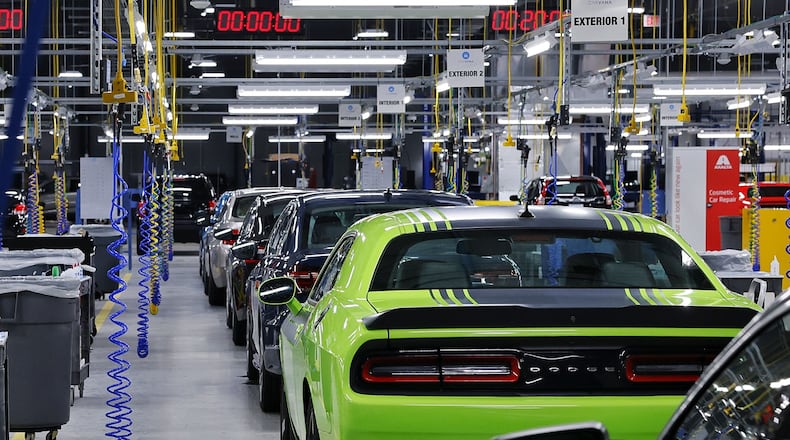“These are unprecedented times,” said Dan Bates, president of the Hamilton Chamber of Commerce. “There are so many jobs and not enough people.”
Tiffani Jones, a recruiter at Carvana, a 200,000-square foot facility that cost $24 million to build, certainly can attest. In the next five months, Carvana needs to hire about 900 employees in order to fully operate its eight lines for two shifts, she said. Jones said 700 more employees are needed to work in the reconditioning department, 200 more in logistics and 12 in wholesale.
“There is a lot of opportunity,” she said.
Since the local Carvana has a current workforce of about 200, it’s running only two lines for one shift, or 12.5% of its capacity, she said.
First shift at Carvana runs from 6 a.m. to 3 p.m. Monday through Friday. Entry level positions pay $15 an hour, or $30,000 a year, and those in the body shop can make up to $30 an hour, based on experience, according to Jones.
Jones and another recruiter at Carvana are constantly searching job sites, passing out flyers and meeting with high school, college and technical school representatives throughout the Dayton and Cincinnati regions. Carvana must recruit from outside Butler County to find enough employees, she said.
“We are out there,” she said.
Some of the major selling points for working at Carvana include “amazing benefits” and the opportunity for advancement, she said.
Carvana believes in promoting from within, said Justin Nelsen, the general manager.
“We’re giving them a career, not just another job,” said Nelsen, who transferred from a Carvana site in Indianapolis where he worked for 3 1/2 years. “Somebody can come in with zero knowledge in the automotive industry and we’re going to teach all the skill sets.”
If Carvana is successful in attracting hundreds of employees, some wonder if those people will leave their current jobs for more money and better benefits. If that happens, it will cause a trickle down effect, Bates said. Those employees will then have to replace the workers who left.
“That’s going to be a challenge,” Bates said.
Bates said he has seen a “drastic change” in what employers and employees are seeking since the outset of COVID-19. Those seeking employment are looking for work places that offer a positive culture, greater flexibility and competitive wages, he said.
“We are in the middle of a shift and I don’t see it ending anytime soon,” he said.
Bates and Rick Pearce, president of the Chamber serving Middletown, Monroe and Trenton, and collaborating on work initiatives to address the worker shortage.
Pearce said all employers are looking for “good people with quality skills” to join their organization.
“Butler County does not lack an opportunity in the employment field,” he said.
David Fehr, Butler County’s director of development, said local companies are in competition for employees with the rest of the country.
“I think we really need to be looking at what are the jobs of the future and do we have those sites available,” he has said. “Do we have workforce available? Do we need to work with the Butler Techs of the world to make sure we are training the workforce for the jobs that are coming?”
Fehr said as fuel prices and inflation continue to rise, those “Baby Boomers” who have “sat on the sidelines” may return to the workforce.
About the Author


